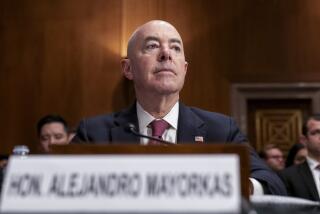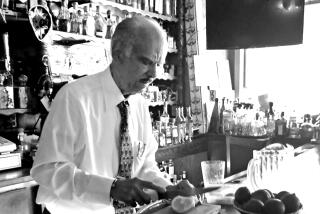Marcos Hosted Ezell While Fighting INS Order
Former Philippine President Ferdinand E. Marcos was contesting an order by the U.S. Immigration and Naturalization Service sharply curtailing his travel rights at a time when he hosted a dinner party for top INS officials at his Honolulu residence last summer.
INS officials, including Western Regional Commissioner Harold Ezell, have defended their appearance at a dinner at the Marcos home last Aug. 3, contending that the former Philippine leader was in no position to influence them on any pending matter.
However, agency documents and interviews with officials demonstrate that at the time of the dinner, Marcos was fighting an INS “departure control” order requiring that he receive agency permission to leave the island of Oahu. Marcos is still contesting the travel order, which was issued in 1987 and remains in effect.
Considered Harmless
Ezell, whose responsibility includes California, Arizona, Nevada, Hawaii and Guam, has characterized the dinner as a harmless social function. He has noted that no business was discussed with Marcos or his wife, Imelda, both of whom attended the dinner.
Ezell, based in Laguna Niguel, has also said that he was unaware when he accepted the dinner invitation that the U.S. Department of Justice--parent body of the INS--was investigating the financial dealings of Marcoses. Last month, a federal grand jury in New York indicted the deposed first family on racketeering charges.
Ezell, one of the highest-profile federal officials in Southern California, was on vacation Thursday and Friday and was not available for comment. However, Robert Moschorak, associate regional commissioner for operations, said that he was unaware that Marcos was contesting the travel restriction when he and Ezell went to the dinner. Moschorak declined to say whether knowledge of that proceeding would have altered their decision to attend.
But agency documents show that INS officials in Honolulu knew as early as August, 1987, that the Justice Department was conducting a separate investigation involving the former head of state.
In fact, a reason cited for the travel restriction imposed on Marcos was a contempt citation slapped on the former president in February, 1987, after he failed to appear and provide documents to a federal grand jury in Alexandria, Va., according to INS documents. Another reason for the travel restriction was an insurrection that Marcos was allegedly planning against the government of Corazon Aquino.
The precise reasons for the travel limitation were described in a letter to Marcos, dated Aug. 26, 1987, from William W. Craig, INS district director in Honolulu. Craig also attended the dinner at Marcos’ home.
Ezell has said that he agreed to attend the dinner after being assured by Craig, the top INS official in Hawaii, that Craig had cleared the matter with officials in Washington. Craig has declined to name those officials.
Craig was off work this week and not available for comment. His deputy, Roy Hendricks, declined to comment.
Duke Austin, an INS spokesman in Washington, also declined to comment. The INS’ internal affairs unit, the Office of Professional Responsibility, is conducting a preliminary review of the dinner to determine if it merits a full-fledged investigation, Austin said several weeks ago.
Robert L. Bombaugh, director of the Office of Immigration Litigation in Washington, which is handling the INS’ travel restriction case against Marcos, confirmed in a telephone interview that the former Philippine president is contesting the restrictive order. The case is still awaiting a hearing date.
Two attorneys who have represented Marcos in the case, Lex R. Smith in Honolulu and Richard A. Hibey in Washington, did not return several telephone messages.
Although word of the dinner is said to have caused considerable embarrassment in Washington, authorities have indicated that no laws or ethical guidelines were broken. They noted that Marcos had not been indicted at the time the dinner took place.
Under the travel restrictions, Marcos must receive written permission from the INS before leaving the island of Oahu, where he has remained since arriving in the United States. In proposing to leave Oahu, he must provide INS officials with a range of information, including his itinerary, means of transportation and the purpose of his trip.
Marcos, ousted after two decades as Philippine head of state, arrived in Hawaii aboard a U.S. Air Force transport in February, 1986, along with scores of supporters. Marcos and his wife were allowed to enter the United States on “parole,” an immigration status used for humanitarian, legal, national security and other reasons. The Marcoses’ legal status in the United States is renewed on an annual basis.
The dinner honoring INS officials for their work with the Philippine community was arranged by Jose Lazo, a wealthy Philippine-born Honolulu travel agent who heads a group called Friends of Marcos. The affair was held at the Marcoses’ hillside home in the plush Makiki Heights section.
The businessmen, not Marcos, picked up the tab for the affair, according to INS officials. The event was attended by more than 100 people, including the Marcos family, more than a dozen INS officials and a number of Filipino-American businessmen. The immigration contingent was in Honolulu for a management seminar.
More to Read
Sign up for Essential California
The most important California stories and recommendations in your inbox every morning.
You may occasionally receive promotional content from the Los Angeles Times.










